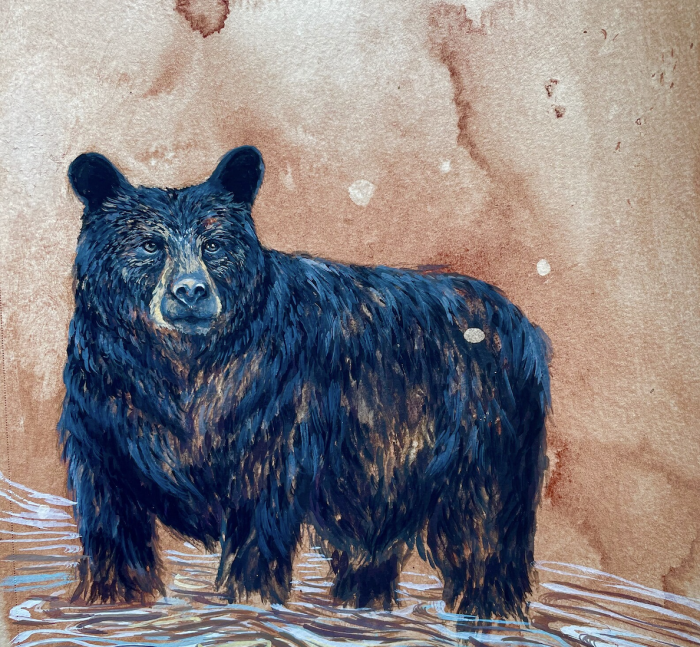
{*Did you know you can write on Elephant? Here’s how—big changes: How to Write & Make Money or at least Be of Benefit on Elephant. ~ Waylon}
~
I am embarrassed.
My brothers have let me down again—as they have you.
We keep hoping this will be the time they step up and say, “I am part of the problem, and I need to find out how to be different so girls and women can be safe in the world.” We keep hoping this time will be different.
I understood it from the first post I saw about the “Bear or Man” social experiment and conversation. We know what bears will do and why. We know they do not want to harm us for sport or to feel superior. We know the worst they can do is kill us.
But a man in the woods is a whole different story.
As a man, I cringe every time I read or hear a man talk about the men who hurt women, as if there are 10 or 20 of them among a population of four billion boys and men in the world. They speak of them as crazed lunatics we should lock up forever so girls and women will be safe. They do not internalize or want to accept that we are talking about several hundred million boys and men globally who have sexually assaulted or beaten girls and women. And their solution? They want women to dress and act in a way that will keep them safe, as if any woman was assaulted or beaten because of the shade of her lipstick or because her hair was in a ponytail instead of a bun.
In 1992, I had the opportunity to volunteer at a rape crisis center in New Jersey where I would participate in presentations at schools, colleges, universities, and corporations about date and acquaintance rape. I would share my experiences and answer questions.
As a mostly clueless recovering addict, three years sober at the time, I was startled and surprised by how many girls and women had been sexually assaulted and raped. I had no clue, which is hard to believe since I was once a perpetrator of this specific crime that I didn’t think happened often.
She was a friend. We lived a hundred feet away from each other. I was probably in love with her as much as I was able to love anybody at that time in my life. But I was also miserable, angry, resentful, bitter, and full of self-hate. I had been using alcohol, drugs, and anything else I could find to attempt to numb the pain, shame, and hate, but it rarely worked.
One particular night, I was kicked out of my room. When I went to crash on the couch, my friend was drunk and in a deep sleep. I moved her so we could both sleep on the couch; she resisted but fell back asleep. I felt excited and full of energy. I knew what I was thinking about doing was awful and that it would end our friendship. I did it anyway.
In the morning, when I woke up in my bedroom, she told our friends and kicked me with all her strength. We were never friends again.
The shame was unbearable. And it was another eight years before I got sober.
Years later, while volunteering, I realized how scary it was that so many women had to deal with this, but it wasn’t until decades later that I truly understood how prevalent sexual assault and rape are in American culture.
As I accepted these presentations, my self-respect grew and my shame and embarrassment decreased minimally. But it was still happening—and now I was aware of it. I was also starting to respect girls and women more for their strength and courage, which was new to me.
Seeing the challenges they experienced as part of being female was startling. How did I—or other men—not know about this or its prevalence? What was it like to carry these pains and scars without being able to share them with the men in your life without being shamed, blamed, or dismissed? How did I, of all people, not know?
The shame was crushing.
For men who may experience similar challenges, the message I have for you is this: please don’t give up.
The women in our lives need us to be more than our shame, self-hatred, and violence. They need us to step out of our pain, trauma, and numbness, and step into being the men we were born to be before toxic masculinity squashed it out of us. We get to offer the part of us that is strong enough to fight against impulses and no longer terrorize women, children, other men, and ourselves.
This is how we protect women; it doesn’t happen in the gym, the shooting range, or the military. It happens right here in our own mind, body, and spirit.
Recently, a new friend and I walked downtown one night. Even though we barely knew each other, she shared with me that the reason she had been staying home and not going out lately was because she had been raped and was scared to leave her home.
I had tears in my eyes on the ride home that night. When I think about my own life, as I did on that ride home, this is what I think about: I used to be the reason that girls and women cried in other people’s arms. But now I’m the arms they cry in.
When men want to know “what to do” in those moments, this is it. All we have to do is love them. We don’t need to fix them, we don’t need to teach them how to do anything, we certainly don’t need to give them a Gettysburg Address telling them what their experience is, and we don’t need to feel shame for something we didn’t do that one of our brothers did. We just need to be with them and love them.
When women talk about wanting men to be protectors, this is what they’re talking about. When they show up and pour out their pain and sadness and whatever mess they are experiencing at that moment, what they need from us is to be present and to love them. Even if we’ve only know them long enough that we still have to try and remember their name, we can hold them, create a safe space for them, and love them.
The fact that this woman was half my age, I found her attractive, and she was vulnerable had nothing to do with what she needed from me that night. She needed evidence that there was at least one man in the sea of male human beings who would not exploit, manipulate, or take advantage of her. She just wanted to be seen, heard, and loved.
This is how we show up as protectors and providers.
Many men think that being a protector means having a bulky neck or chest and arms full of muscles that make it hard to pick up a napkin off the floor, or having multiple guns or practicing mixed martial arts. But what they fail to understand is, yes, you can protect her from another man, but who will protect her from you? When she sees you threatening, beating, and taunting other men twice her size, she is acutely aware that you can easily demolish her if you lose your temper.
I think of that scene in the original “Roadhouse” movie when Patrick Swayze and Kelli Lynch sit on the roof. He passionately tells her why he needs to keep beating up “the bad guys” so that she and everyone else are safe. And she responds, “But who will protect us from you?”
Let’s be real. Most women do not run into bears, lions, snow leopards, tigers, or crocodiles on a daily basis. So, the primary thing that we men can protect them from is other men. Meaning, we are both “the protectors” and the thing they need protection from!
I invite you to breathe that in and let it swirl in your belly for a moment. If there were no violent men in the world, women wouldn’t need us to be protectors because there wouldn’t be anything we’d need to protect them from. It’s us—we are the thing they need protection from. If you really want to be a protector, I invite you to learn how to be safe enough for women to be in your presence.
And just to be clear, I, too, would choose the bear over the man, not that it matters.
Men, please close your eyes and reflect on how you may be one of the men who makes women feel scared or at risk in your presence. I encourage you to listen to your resistance. What is it trying to hide from you about who you are?
She, the friend from when I was young, is the reason I do the work I do today.
She is why I am willing to push my brothers to be something more than numbness, violence, anger, and shame.
She is why you are reading about my shame and the pain that eventually created opportunities for me to be who I always was but didn’t dare to be.
Now is our time to stand up for our sisters around the world.
We can do better than this.
We can do much better than this.
~

This account does not have permission to comment on Elephant Journal.
Contact support with questions.